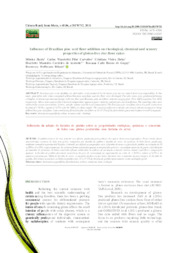Influence of Brazilian pine seed flour addition on rheological, chemical and sensory properties of gluten-free rice flour cakes.
Influence of Brazilian pine seed flour addition on rheological, chemical and sensory properties of gluten-free rice flour cakes.
Author(s): IKEDA, M.; CARVALHO, C. W. P. de; HELM, C. V.; AZEREDO, H. M. C. de; GODOY, R. C. B. de; RIBANI, R. H.
Summary: Brazilian pine seeds (pinhão) are gluten-free seeds produced by the native pine species named Araucaria angustifolia. In this study, gluten-free cake mixes composed of Brazilian pine seed flour and rice flour were developed. The cake mixes were produced following a Simplex Centroid experimental design, with rice flour and Brazilian pine seed flour contents ranging from 50 to 100% and from 0 to 50%, respectively. Mixes were analyzed for chemical composition, apparent paste viscosity, and particle size distribution. The resulting cakes were analyzed for sensory acceptance, texture, specific volume and chemical composition. The Brazilian pine seed flour showed a peak viscosity on heating of 1.761Pa.s against 4.747Pa.s for the 100% rice flour sample. The variation of firmness of cakes decreased with increasing percentage of Brazilian pine seed flour. Cakes containing Brazilian pine seed flour at 25-37.5% of the formulation presented highest overall acceptance.
Publication year: 2018
Types of publication: Journal article
Unit: Embrapa Food Technology
Keywords: Araucária Angustifólia, Bolo, Espécie Nativa, Pinheiro do Paraná, Pinhão
Observation
Some of Embrapa's publications are published as ePub files. To read them, use or download one of the following free software options to your computer or mobile device. Android: Google Play Books; IOS: iBooks; Windows and Linux: Calibre.
Access other publications
Access the Agricultural Research Database (BDPA) to consult Embrapa's full library collection and records.
Visit Embrapa Bookstore to purchase books and other publications sold by Embrapa.

